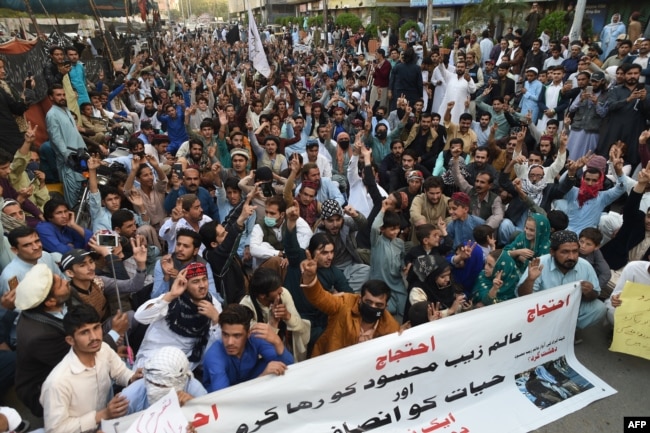By Madeeha Anwar
Emotions are running high among Pashtuns over the alleged killing of a Pashtun regional leader by Balochistan police earlier this week.
Pashtuns have long felt neglected and wrongly targeted in Pakistan by the government, and in particular by the powerful military. The most recent target was Arman Luni, a leader of the Pashtun Tahafuz Movement (PTM), which advocates for Pashtun rights and an end to militancy in Pashtun-populated regions.
He was reportedly beaten to death Saturday after a clash with police, which followed a four-day protest against a recent terror attack in Balochistan province's Loralai district.
PTM’s leadership has called for protests throughout Pakistan against Luni’s killing at the hands of what they called the state. They have vowed not to stay calm until they think justice has been served.
“I swear to Quran that we will not let go, and avenge his blood. ... [In our province,] they killed our youth, beheaded our elders, destroyed our homes, dishonored our mothers and sisters,” PTM leader Manzoor Pashteen said to a charged crowd after Luni’s death.
“They still chase our youth. It reached a point where they even prevent us from attending our funerals. In such circumstances, when you block all our options and ways for negotiations, we will forcibly find a way. Then we will show you the power of Pashtuns,” he added.
PTM workers in Pakistan staged countrywide protests in reaction to Luni’s death on Tuesday. Several PTM workers were arrested in Islamabad following the protests. Authorities have yet to provide a reason for their arrests.
Sister's accusation
Luni’s family accuses the Balochistan police force of intentionally beating and killing him.
“Arman was participating in the Loralai sit-in and left after talks with the government. But the police then attacked the protesters. One of the policeman hit Arman on his head, due to which he died on the spot,” Luni’s sister, activist Wranga Luni, told VOA.
Balochistan’s provincial government, however, denies the allegations and maintains that Luni died of a heart attack.
“This is a big mishap, an effort to destabilize Balochistan, and to incite hatred. There was no torture on Luni, and I suggest we should wait for the post-mortem and detailed medical report before coming to any conclusion,” Mir Ziaullah Lango, Balochistan’s home and tribal affairs minister, told VOA.
“Justice will be served, and I will even form a judicial committee to probe the killing if needed,” he added.
Years of targeting alleged
Luni’s family and friends say Luni paid the price for his strong criticism of the state institutions, which he accused of not acting against extrajudicial killings of Pashtuns and of violating their rights.
“The establishment [military] always eliminates our effective members. We do not know who is effective and who is not but establishment always recognize and eliminates them to make others change their path … the establishment put its policy into practice as it has done so for the past 70 years by eliminating our effective members. Arman was effective and that is why he was eliminated,” Wranga Luni told VOA.
“Arman’s aim was to do something for the oppressed Pashtuns,” she added.
Some analysts warned against rushing to judgment before the facts from the investigation were available.
“I think Luni died on the spot due to a heart attack and not torture. I think the allegations that Luni was killed due to torture are baseless. Let’s wait for the post-mortem and everything will be cleared,” Mehmood Shah, a Pakistan-based political analyst, told VOA.
But other analysts, such as Hamid Mir, a prominent journalist and commentator, charged that government should not use force to silence people.
“Whatever view professor Luni held, whether he was a supporter of PTM or not, you can have differences of opinion with him and be against his political views,” Mir said this week on Jeo TV, a private TV station in Pakistan, in reaction to Luni's death.
Killing someone to suppress a point of view — particularly when the killing is committed by a police officer, a law enforcer — "is a challenge to the writ of the state, and it is a challenge for Prime Minister Imran Khan and the chief minister of Baluchistan,” Mir added.
‘Nothing will stop us’
Pashtun activists maintain the military and establishment are afraid of the power of the Pashtun movement.
“I have seen the dead body and I can assure you — there were signs of torture on the body,” advocate Hassan Agha, a PTM activist from Balochistan, told VOA.
“And I assure you nothing will stop us from this point onward. The torture, the police, the jails, the killings — nothing,” he added. “Nothing will now stop PTM.”
The PTM emerged last year after the extrajudicial killing of a Pashtun man in Karachi. The movement has since been regularly mobilizing thousands of Pashtuns against what they believe is the state's marginalization of Pashtuns.
PTM accuses the Pakistani military of forcing evictions of Pashtuns from the tribal region that borders Afghanistan. They say militancy and military operations in the region have claimed the lives of thousands and forcibly displaced thousands more. Pakistan’s government deny the PTM’s charges.
Who was Arman Luni?
Luni, 35, was from the Ziarat district of Balochistan province. His real name was Mohammad Ibrahim Luni.
Luni, 35, was from the Ziarat district of Balochistan province. His real name was Mohammad Ibrahim Luni.
He was a poet and taught Pashto literature at a government college in Balochistan province. He joined PTM last year in February.
Luni had repeatedly protested alleged targeted killings by the state and had criticized the state for marginalizing Pashtuns. He also raised awareness for those affected by militancy and government military operations in Khyber Pakhtunkhwa and Balochistan provinces.
Luni was responsible for holding a four-day sit-in in Loralai against a militant attack on police in the city. At least eight people lost their lives in the attack.


No comments:
Post a Comment